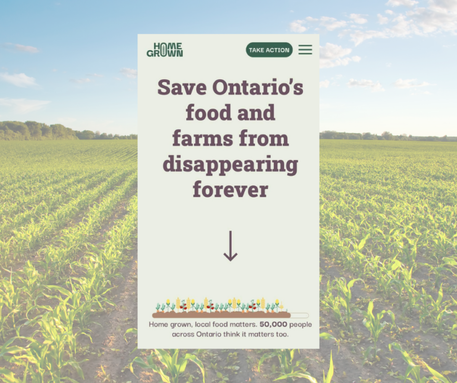More than 50,000 Ontarians sign on to Home Grown to show support for farmland preservation11/28/2022 GUELPH, ON [November 28, 2022] – With a growing concern for the fate of Ontario’s fertile farmland, more than 50,000 people have signed on to show support for the Ontario Federation of Agriculture’s (OFA) Home Grown campaign.
The campaign, a public awareness initiative showcasing the threat to rural lands from urban sprawl and development, reached the milestone number over this past weekend. It shows strong support for smart urban planning policies that encourage development within existing urban areas while preserving the farmland that provides Ontario — and the world — with food, fuel, fibre and flowers. “We are losing productive farmland at an alarming rate in Ontario,” says OFA President Peggy Brekveld. “The path we are currently on is not sustainable. We cannot continue to sacrifice the lands where we grow and raise our food in the name of growth. It may take some effort and creative thinking, but we can continue to develop Ontario without paving over our most precious natural resource – fertile farmland.” According to the 2021 Census of Agriculture released earlier this year, Ontario is losing an average of 319 acres of productive farmland every day. Since 1996, Ontario has lost 1.5 million acres of productive farmland — an area roughly the size of Toronto, Peel Region, Halton Region, Waterloo Region, Hamilton and Niagara Region combined. These are stunning figures, especially when you consider that only five per cent of Ontario’s land is considered arable. While the province is geographically large, much of the northern reaches cannot be farmed because of the Canadian Shield and climate. In the South, cities and towns cover much of the landscape. Every 319 acres of farmland that we lose is equivalent of losing nine family farms every week. In terms of the feed we eat, 319 acres can produce more than 23.5 million apples, 1.2 million bottles of Ontario VQA wine or 37.1 million strawberries. Agriculture and food in Ontario is a major economic driver contributing $47 billion annually to the provincial economy and employing nearly one million Ontarians through skilled labour, trades, technology, innovation and more. The loss of thousands of acres of agricultural land has the potential to jeopardize our domestic supply chain and local food production. The impact will be felt on consumers today and for future generations. “We’ve seen how supply chain shocks and delays have affected the price and availability of everyday goods that our families rely on,” says Ms. Brekveld. “These same supply chain shocks and delays have resulted in the worst inflation Ontario has seen in more than three decades. We are seeing product shortages because of weather patterns in foreign countries. Far away turmoil like the war in Ukraine affects global food security. And, if nothing else, the pandemic has emphasized the importance of local production across many sectors of our economy. Farming matters. Where we grow our food matters, too. Ontario has some of the best tastes and quality in the world.” Thank you to the more than 50,000 people who have signed on to support the Home Grown campaign and share the OFA’s vision of Farms and Food Forever. Learn more about the OFA’s Home Grown campaign and add your signature to the wall at homegrownofa.ca. About the Ontario Federation of Agriculture The Ontario Federation of Agriculture (OFA) is the largest general farm organization in Ontario, representing 38,000 farm families across the province. As a dynamic farmer-led organization based in Guelph, the OFA works to represent and champion the interests of Ontario farmers through government relations, farm policy recommendations, research, lobby efforts, community representation, media relations and more. OFA is the leading advocate for Ontario’s farmers and is Ontario’s voice of the farmer. For more information, visit www.ofa.on.ca. About Home Grown A public awareness initiative of the Ontario Federation of Agriculture, Home Grown is a campaign to advocate for the importance of Ontario farms as a source of food, fuel and fibre. Arable farmland is our most important natural resource, but Ontario is losing an average of 319 acres of farmland every day; that is the equivalent of nine family farms paved over every week. It is the objective of Home Grown to raise awareness about the importance of protecting and preserving Ontario farmland, while helping develop a workable plan to guide responsible development in Ontario that will ensure growth to provide housing and support local tax bases in a way that does not encroach on farmland. Join the conversation on Twitter @OntarioFarms and Facebook /ontariofarms. For more information, please visit homegrownofa.ca. For more information, contact: Tyler Brooks Director of Communications and Stakeholder Relations Ontario Federation of Agriculture 519-821-8883 ext. 218 [email protected]
0 Comments
 GUELPH ON [November 22, 2022] – Ontario’s farmers hosted their annual general meeting in London over the past two days, gathering in-person for the first time in three years to debate resolutions, listen to engaging speakers and participate in educational workshops. Approximately 450 people attended the meeting, which marked the first time the Ontario Federation of Agriculture’s (OFA) Annual General Meeting was held in London. Keynote speaker Jeff Adams, Paralympian and six-time world champion wheelchair racer, drew on his own life experiences to share themes also common in the farming community: resilience, perseverance and striving for excellence. He encouraged farmers to look around themselves for support from family, friends and community when they need it, and to offer that support to others. “After several tough pandemic years, Jeff’s message highlighted the tremendous value of community and interpersonal connection that we’ve missed since the last time we were able to host our convention in-person,” says Peggy Brekveld, OFA President. “Jeff’s message was also an inspiring one to our audience because it ties in so strongly with the Farmer Wellness Initiative, a mental health support program for farmers and their families that OFA has put a lot of effort into this past year.” Ontario’s Minister of Agriculture, Food and Rural Affairs Hon. Lisa Thompson addressed the crowd, highlighting recent government investments into the sector and efforts currently underway to update various pieces of legislation impacting agriculture, including modernization of the Veterinarians Act, and consultations around the Agricultural Research Institute of Ontario. Other speakers at the event included MPP and Agriculture critic John Vanthof, Dean of the Centre for Research and Innovation at Fanshawe College Alison Ewart, Scotiabank Chief Economist Jean-Francois Perrault, Scotiabank National Head of Agriculture Janice Holzscherer, Hydro One Vice President of Stakeholder Relations Daniel Levitan, and Canadian Federation of Agriculture President Mary Robinson. OFA also announced the five recipients of its newly expanded bursary program for young people: post-graduate winner Valerie Higginson, apprenticeship winner Andrew Kuiack, and undergraduate winners Faith Emiry, Michael Jones and Lexi Johnston. A silent auction at the event raised more than $10,000 in support of next year’s bursary program. The Ontario Federation of Agriculture (OFA) is the largest general farm organization in Ontario, representing 38,000 farm families across the province. As a dynamic farmer-led organization based in Guelph, the OFA represents and champions the interests of Ontario farmers through government relations, farm policy recommendations, research, lobby efforts, community representation, media relations and more. OFA is the leading advocate for Ontario’s farmers and is Ontario’s voice of the farmer. For more information, visit ofa.on.ca. For more information, contact: Tyler Brooks Director of Communications and Stakeholder Relations Ontario Federation of Agriculture 519-821-8883 ext. 218 [email protected]  OFA’s northern Ontario Director Bill Groenheide (left) and Ethan Wallace, Zone Director for Huron-Perth (far right) stand with bursary recipients (from left to right) Lexi Johnston, Faith Emiry and Andrew Kuiack. OFA’s northern Ontario Director Bill Groenheide (left) and Ethan Wallace, Zone Director for Huron-Perth (far right) stand with bursary recipients (from left to right) Lexi Johnston, Faith Emiry and Andrew Kuiack. GUELPH, ON [November 21, 2022] – The tradition of celebrating young people in agriculture continued at the Ontario Federation of Agriculture’s (OFA) 2022 Annual General Meeting today as the organization named five winners in its newly expanded Bursary Program. Along with offering three bursaries awarded to students in undergraduate programs studying agriculture, OFA has added a bursary this year for a person completing an apprenticeship, as well as one for an individual completing a post-graduate or leadership development program. Each bursary is worth $2,000. “The addition of two new bursaries made it possible for us to recognize the importance of all levels of education in setting people up for success in our industry. This year’s recipients represent the diverse skillset the next generation of young leaders bring to the agriculture industry,” says Peggy Brekveld, OFA President. “We’re proud to recognize five individuals who are dedicated to using their skills to better agriculture and Ontario’s rural communities.” Applicants are judged based on demonstrated leadership skills, involvement in the community, and varied accomplishments in both school and the agriculture industry. Post-graduate bursary winner Valerie Higginson of Vankleek Hill is completing her final year in the Doctor of Veterinary Medicine program at the Ontario Veterinary College, University of Guelph. She grew up on her family’s sheep farm and spent weekends and summers milking cows. After graduating next spring, Valerie intends to pursue a position as a food animal veterinarian working primarily with bovine species. She hopes to give back to the industry that raised her by volunteering as a 4-H leader, mentoring upcoming students, and joining industry boards. Apprenticeship bursary winner Andrew Kuiack is apprenticing through the Agriculture Equipment Technician program offered at Fanshawe College. He grew up in Ottawa, but a move west inspired a different path for his life. Andrew credits a friend for taking him under his wing and sparking the passion that has now grown into a career as a mechanic at a local dealership. Andrew is also dedicated to the herd of cattle he raises with his wife and kids and is proud to sell beef to his local community. Undergraduate bursary winner, North/East region Massey, Ontario native Faith Emiry is finishing her undergraduate degree at the University of Guelph in the Food, Agriculture and Resource Economics program. Growing up on a dairy farm with a seasonal strawberry patch, Faith was accustomed to hosting school groups and community members. This fostered a passion for advocating on behalf of agriculture and representing the industry positively. Faith has honed her leadership and communication skills by holding an executive position on the OAC Class of 2023 board for all four years of university. After graduation, Faith intends to work in a role that bridges the gap between farmers and consumers. Undergraduate bursary winner, Central region Michael Jones is a Bachelor of Applied Science candidate in Chemical Engineering, Class of 2025. at Queen’s University. Hailing from Midland, Ontario, Michael’s passion for soil science can be traced back to elementary school. His resume includes two award-winning research projects, extensive volunteer work, and a diverse list of jobs like pharmacy assistant and co-owning a produce business. With a specialization in biochemical engineering, Michael is striving to be a part of advances in agricultural chemical technology, working as a process engineer or development researcher. Undergraduate bursary winner, Southwest region Lexi Johnston of Listowel is a student at the University of Guelph in the Bachelor of Science in Agriculture program, majoring in Animal Science. With a well-rounded resume of judging accolades, leadership positions, volunteer work and 42 completed 4-H clubs, Lexi aims to bring a wealth of knowledge back home to the family dairy and grain farm. She has a keen eye on the future, aspiring to maximize herd production and cow comfort. Lexi’s passion for agriculture and her community is evident in the amount of time she has dedicated to giving back to both. Funds raised at the silent auction held at this year’s AGM will go toward OFA’s 2023 Bursary Program. OFA invites students to look for announcements regarding applications in late spring. For more information on OFA’s bursary program, visit ofa.on.ca/bursary. The Ontario Federation of Agriculture (OFA) is the largest general farm organization in Ontario, representing 38,000 farm families across the province. As a dynamic farmer-led organization based in Guelph, the OFA represent sand champions the interests of Ontario farmers through government relations, farm policy recommendations, research, lobby efforts, community representation, media relations and more. OFA is the leading advocate for Ontario’s farmers and is Ontario’s voice of the farmer. For more information, visit ofa.on.ca. For more information, contact: Tyler Brooks Director of Communications and Stakeholder Relations Ontario Federation of Agriculture 519-821-8883 ext. 218 [email protected] SPECIAL EDITION: OFA pleased with strong support for broader fuel tax exemption for farmers11/17/2022  By Peggy Brekveld, President, Ontario Federation of Agriculture Canadian agriculture has come another step closer to expanded fuel surcharge exemptions for essential farming activities, which will bring meaningful relief to farmers across the country. The House of Commons Standing Committee on Agriculture and Agri-Food has approved a private member’s bill exempting propane and natural gas used for heating livestock barns and drying grain from federal carbon surcharges, sending it back to the House for third and final reading. The federal fuel surcharges for the price on carbon have placed a significant financial burden on many farmers across Canada. As farmers, we depend on fuels like natural gas and propane to heat and cool livestock barns or dry grain crops to keep them from spoiling. These aren’t optional activities – and unfortunately, there currently are no practical, affordable alternative energy options readily available. Last year, the Ontario Federation of Agriculture (OFA) released results from research conducted by Agri-food Economics Systems that estimated the explicit cost burden of the fuel charge on livestock housing with seasonal heating requirements, grain drying, and greenhouse production in Ontario to increase to just over $156 million per year by 2030. The cumulative costs to Ontario farmers between now and full implementation of federal carbon pricing structures in 2030 are estimated at over $890 million. We recognize that agriculture isn’t the only sector that is affected by carbon pricing, but the biggest challenge for our industry is that we operate in a global economy and most farmers are price takers not setters. This creates a natural inability to pass on increased costs through the price of the products we produce on our farms. That’s why the OFA strongly supported Bill C-234, An Act to Amend the Greenhouse Pollution Pricing Act, which is sponsored by Huron-Bruce MP Ben Lobb. We provided a written submission in support of the bill, and I recently travelled to Ottawa to make a presentation in favour of this legislation to the House of Commons Standing Committee on Agriculture and Agri-Food. OFA has been pushing for broader agricultural exemptions for propane and natural gas to ensure that federal government efforts to reduce carbon emissions don’t restrict our ability to produce food and fuel, or negatively impact animal welfare, food safety or food quality. If passed, Bill C-234 would expand the list of essential farming fuels exempt from carbon pricing to include marketable natural gas and propane. It would also modify the definition of eligible farming machinery to explicitly allow natural gas and propane to be used to generate heat for raising and housing livestock and grain drying. The combination of these two changes recognizes the significant and increasing financial burden the fuel charge has placed on farmers during an already turbulent economic time and will provide immediate relief to Ontario farmers. It will also give the sector time to adapt and implement alternative solutions and technologies that will support Canada’s climate change goals. The nature of agricultural production and marketing means that farmers are always looking for ways to reduce costs and improve efficiencies. However, most technologies do not eliminate the current need for fossil fuels in agricultural production. In the agricultural sector, the cost of energy alone without the fuel charge applied is already a significant price signal to drive improved efficiencies and reduce consumption. The point of a fuel surcharge is to change behaviour but because farmers must heat or cool livestock barns and dry grain, completely changing this behaviour is not a realistic option. We recognize the need for collective action on emissions and that we all have a role to play in mitigating the impacts of climate change. Agriculture, however, is one of the few industries also capable of sequestering carbon and additional opportunities for climate change progress lie with incentivizing farmers to manage the carbon cycle. We appreciate and support the steps taken by Bill C-234 to improve the Greenhouse Gas Pollution Pricing Act and ensure it is effective and equitable legislation. We believe the passing of Bill C-234 is critical to allowing our farmers to remain leaders in environmental stewardship without compromising our position in the world as producers of sustainable, nutritious food. For more information, contact: Tyler Brooks Director of Communications and Stakeholder Relations Ontario Federation of Agriculture 519-821-8883 ext. 218 [email protected]  By Drew Spoelstra, Vice President, Ontario Federation of Agriculture Ontario needs more homes, built faster – that much is true. The Golden Horseshoe area is poised to see unprecedented growth over the next few decades and it’s important that we work towards a better plan to accommodate folks that want to call this province home in the future. Ontario also needs a strong, stable, sustainable supply of farm and food products grown, harvested and processed right here in one of the best food producing regions in Canada. These two complex issues deserve to carry equal weight in the planning processes and decision making for our growth areas, cities, towns, rural hubs and communities. Earlier this month, the Ontario government announced it is proposing to rezone thousands of acres of prime farmland in the Greenbelt and other regions to build up to 50,000 new homes as part of its Bill 23 – More Homes Built Faster Act. That’s a change that’s of serious concern to the Ontario Federation of Agriculture (OFA). Our members from Windsor to Winchester have told us over and over again that prime agriculture land is irreplaceable and worth fighting for. Farmland losses are already at an incredible 319 acres per day in our province, according to the 2021 Census of Agriculture. Those 319 acres of farmland represent the yearly production of 75 million carrots, 25 million apples, 510,000 chicken wings, beef for 2.2 million quarter pounders, eggs for 5.4 million omelettes or enough feed for 25,000 Clydesdale horses for a day, to name just a few. Farmland is farmland no matter what colour its belt is or what designation it receives. Once it’s lost to development, it is gone forever, and that’s why preserving it is one of the OFA’s top priorities. Ontario has a limited supply of what we call arable land – land that is suitable for growing crops for human consumption. In fact, it accounts for only about five percent of all the land in Ontario. For me, this issue hits very close to home. I’m raising my children on our family farm just outside the urban boundary of the City of Hamilton, which happens to be in the Greenbelt. These new proposals raise serious concerns for me as a farmer, father, and businessperson on what the future of the protected countryside actually looks like. How should I plan for our future? How will our business grow? How much certainty does the Greenbelt designation really give us? And where does the local, on-the-ground, real life community input come into play? These proposed changes represent a real and permanent loss of food production that in the long term won’t impact just me and my family’s farm, but every single person in our province. However, as someone who farms in an urban municipality, I also recognize that our province is in the midst of a housing crisis. OFA understands that rapidly rising costs and a shortage of available housing have created a serious affordability problem for many Ontarians, and that the government needs to find solutions to this issue. Some of the proposed changes in Bill 23, like cutting bureaucratic red tape and increasing consumer protection are long overdue policy changes. OFA knows that the balancing act between farmland protection and further urbanization doesn’t come with an easy answer and that the issues facing us today are complex. That’s why we are proposing the following solutions to meet the needs of the growing urban areas and ensure that we can continue to produce an abundance of farm and food products now and for future generations:
With a responsible land use planning approach, it is possible to build complete communities that can provide for the needs of residents while minimizing sprawl, preventing the loss of farmland, and avoiding additional pressures on urban-rural boundaries. The OFA understands and supports the government’s stated goal of building more houses for Ontarians, but the proposed changes to the Greenbelt and paving over prime farmland, represent a step in the wrong direction. The best use of our arable land is agriculture and by working together, we can come up with solutions that will protect farmland loss and address our province’s housing crisis. The key is a collaborative approach to responsible long-term land use planning that balances meeting housing needs and supporting economic growth with protecting agricultural land. For more information, contact: Tyler Brooks Director of Communications and Stakeholder Relations Ontario Federation of Agriculture 519-821-8883 ext. 218 [email protected]  By Crispin Colvin, Director, Ontario Federation of Agriculture In a few short weeks, Ontario’s farmers will gather for the Ontario Federation of Agriculture’s 2022 Annual General Meeting (AGM). It’s an event I always look forward to, but even more so this year as we finally get the chance to gather again in-person after two years of virtual meetings. I farm in Middlesex County and for the first time ever, the annual conference is going to be held in London on November 21-22 at RBC Place, so I look forward to welcoming my fellow farmers from across Ontario to southwestern Ontario. The AGM is a special highlight on our annual event calendar as it’s the one time of year that federation of agriculture members from all over the province can get together to talk about the issues that are important to farmers, help provide input to the provincial board of directors on policy directions, and enjoy the opportunity to get to know each other a little bit better. For me, that ability to network and make connections with others in the industry is one of the highlights of this event every year. I represent farmers from Middlesex and Lambton counties on the provincial board, but the decisions we make are on behalf of all of Ontario’s farmers, so it’s important to have that opportunity to meet with people from other parts of the province and learn about what matters to them. For delegates attending this convention, it’s also the chance to speak with all the provincial board directors, connect with other farmers, engage with industry stakeholders, and speak with some of the many exhibitors that will be in attendance. The other aspect that stands out for me about attending the annual meeting is the guest speakers. In addition to people who can speak about the hot topics of the day, OFA works hard to bring in presenters who can bring us new points of view and make us think about our worlds a little differently. A highlight on this year’s agenda, for example, is a keynote address by Jeff Adams, a former Paralympian and six-time world champion in wheelchair racing. He’ll be joined by other speakers over the course of the two days who will cover topics like research and innovation and economic outlooks, and we’ll also be hearing remarks from Ontario’s Minister of Agriculture, Food and Rural Affairs, Hon. Lisa Thompson, and MPP John Vanthof, who is the Agriculture Critic for the Official Opposition in Ontario. There’s an educational component to the meeting as well with special workshops addressing key priorities like fraud and cybersecurity, risk management, financial fluency, farmland preservation and land use planning, and taxation. And of course, we can’t forget that this event is also first and foremost a meeting to conduct the business of our organization, a cornerstone of which is a session dedicated to resolutions. This is where delegates debate and vote on resolutions brought forward by county and regional federations across the province that will help direct the actions and activities of the organization for the year ahead. These days, many farm and rural organizations are struggling to find people to fill volunteer positions, and yet it’s never been more important for our voices to be heard. For farmers considering becoming a bit more involved in their industry, the OFA annual meeting is a great opportunity to learn more about the organization and what role they might want to play at the local, regional, or even provincial level. Back again this year is the launch of the interactive AGM app for attendees to utilize during the event. Using this app, you can access the agenda and meeting highlights, learn about the keynote speaker, read guest speaker bios, explore workshops, view exhibitors and sponsors and engage with fellow attendees. The app is now available for download on the Apple App Store and Google Play Store. A livestream of the annual meeting will be available on OFA’s YouTube channel at youtube.com/ontariofarms or by accessing the link on our website at ofa.on.ca/agm. We invite everyone who can’t join us in-person to catch the livestream beginning Monday, November 21 at 8:15 a.m. The countdown is officially on, and we eagerly anticipate the opportunity to see and connect with everyone again. For more information, contact: Tyler Brooks Director of Communications and Stakeholder Relations Ontario Federation of Agriculture 519-821-8883 ext. 218 [email protected] |
Archives
April 2024
Categories |


 RSS Feed
RSS Feed
